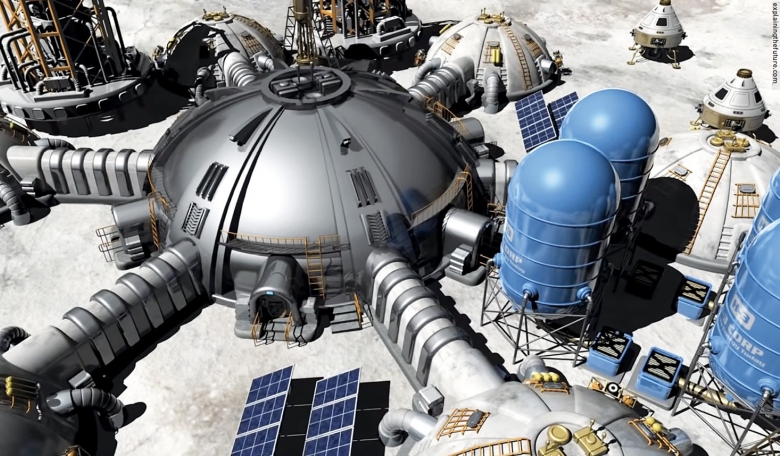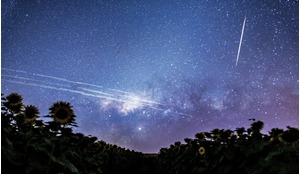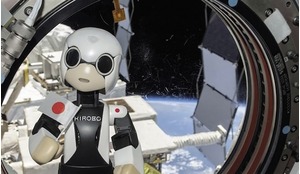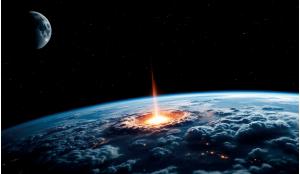For the past six years, the government and citizens of the space nation Asgardia have been working together to chart a new kind of course to the stars for humanity, all too aware that reaching for the stars in more than a metaphysical sense will require more than just rockets, spaceships and technical prowess. Such a goal will not, indeed cannot, be achieved by technical expertise alone. It must be accompanied by humanity itself, by culture, by laws and agreements and values.
Since Asgardia was established in 2016 there have been many exciting moments. Barriers such as geographical distance and Covid restrictions have meant that not all of us have been able to meet together in person but that has not prevented us from establishing the framework for an effective, functioning society and being able to create new and valuable relationships.
Within the confines of the pandemic we embraced the opportunities presented by virtual media, being up to date with digital processes and immersed in these technologies.
Moving forward, we need to reconfigure our critical thinking so that, despite a lack of physical immediacy, we can appreciate globality, interaction and reciprocity.
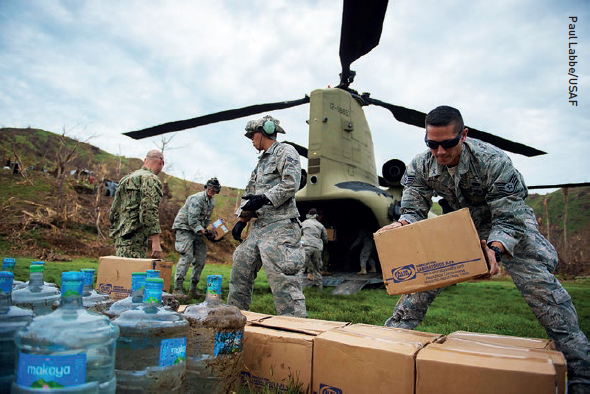 US service members provide humanitarian support and aid the disaster relief mission in areas of Haiti affected by Hurricane Matthew in October 2016. Military personnel are often the only people with the strategic capacity to deal with the aftermath of natural disasters.
US service members provide humanitarian support and aid the disaster relief mission in areas of Haiti affected by Hurricane Matthew in October 2016. Military personnel are often the only people with the strategic capacity to deal with the aftermath of natural disasters.
Alternative solutions
The world and geopolitical relations have shown signs of changes that will influence all of our futures. Humanity has long controlled areas where productivity enabled it to mass produce goods and services. But this is changing, especially where people are facing crises not only of their values but also of resources and stable economies.
Asgardia may not provide the solution for everyone, but it is an alternative for those who have understood that vital changes are needed to continue breathing on a planet that is suffocating in the smoke from the fires and the shrapnel from the fighting.
To use one analogy, a well-cultivated field has to be able to feed not only its immediate area but also the places that depend on it. In the same way, the cultural, artistic and scientific fields are, in essence, places that feed other places on the planet with their wealth, cultivating minds for progress and building the kind of future that we all desire.
So what hinders the dynamics of these possibilities? Ideological fences, moments of democratic crisis, and a lack of equity in the delivery of goods, services and production inputs. Where have the scales tipped and what do we need to do to restore balance and strength?
Replicating the old ways of doing things is no longer a viable method for many people. We need to reconnect with everything that drives us to be our best selves.
‘One Humanity, One Unity’, is the motto on Asgardia’s coat of arms and for many it is an attractive idea. In some circles that look at the cosmos as a site from which vital forces emanate, One Humanity, One Unity is a concordant and essential response, to understand what Hermes Trismegistus already pointed out, “As above, so below”.
We need to reconnect with everything that drives us to be our best selves
Ancient philosophy has already spoken of that exchange of forces that help us connect with others in such a way that we cannot be different from the other without recognising it in ourselves. Therefore, the obligatory question is: Why do we seek to diminish or discriminate against ‘others’?
We still label ourselves according to our ‘tribe’. We are and will always be rooted to that which we belong culturally, but each one of us is also part of the larger context, that of our place in humanity.
What do we need as humans to feel the fullness and happiness that everyone longs for? I would suggest simple things such as work, human contact, harmony in family relationships and with friends, a peaceful place to develop professional, artistic, cultural and creative leisure skills, and doing things that are useful to others and give meaning.
However, depending on where in the world you live you may not always have the facilities that others do to achieve these things; and even your beliefs can be prohibited by hostility and violence.
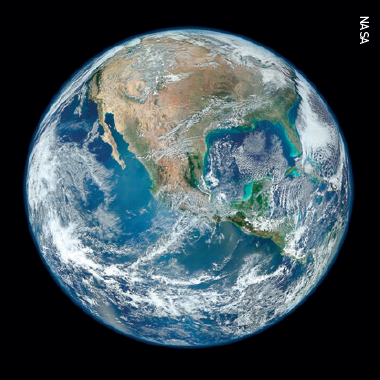 ideaWe need to look at our magnificent blue globe as if from above, and understand its importance in the life of every human being. This Blue Marble 2012 image, taken by the Suomi NPP Earth observing satellite is one of the all-time most viewed images on NASA’s website.
ideaWe need to look at our magnificent blue globe as if from above, and understand its importance in the life of every human being. This Blue Marble 2012 image, taken by the Suomi NPP Earth observing satellite is one of the all-time most viewed images on NASA’s website.
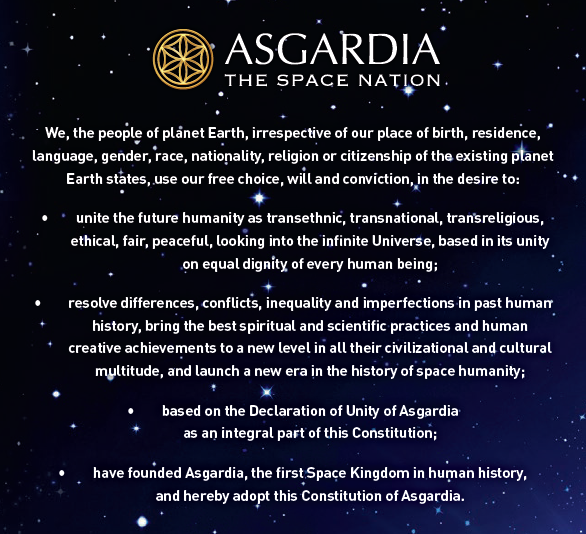 Extract from the preamble to the Constitution of Asgardia.
Extract from the preamble to the Constitution of Asgardia.
Changing perspective
We must make our way into the unknown to find what matters. We need to look at our magnificent blue globe as if from above, and understand its importance in the life of every human being, recognising it as the only place in the solar system that has allowed us to live.
If we can do this, for practical and economic purposes, our global sphere of values could change, presenting an outstanding opportunity to undertake trade and seek allies to place services.
For their part, artists could see a means to sublimate reality and turn it into that dream longed for by every one of us, a space where everything is possible and reality is circumstantial, as long as your dreams are the ones that guide your goals.
Then there are those who produce applied science. Cautious and tenacious, they know that physics has rules, that they cannot be modified and that it is not possible to alter the vulnerability of a living organism to live in environments that are not friendly.
Wherever we go, we find people working or studying, each of them with a dream, perhaps to be the best in their field or simply to be able to provide for themselves and their families. We also discover those who want to walk the easy path, to become predators in different areas of commerce and knowledge. All of these are interacting in the same place called Earth.
Most members of Asgardia joined because they believe the way humanity has developed so far is not good enough. They want to have options in a world where it is increasingly difficult to support the essentials.
Humanity
‘One Humanity, One Unity’, is the motto on Asgardia’s coat of arms and for many it is an attractive idea
The term ‘humanity’ has undergone a series of substantive changes over time. When we wish to address a problem that concerns a group of human beings, it is common to speak of humanity. But today, as a space-travelling species, in what context of race or ideology do you frame the term?
The word ‘humanity’ comes from the Latin ‘humanitas’ meaning ‘human quality’. In this sense, we might infer that in Asgardia, although we belong to different regions of planet Earth, it is important to recognise each of us as living beings sharing the land to which we all belong.
In Asgardia one of our aims is to unite efforts in tasks that can be shared to balance the ecological damage the planet has suffered up to now, to analyse together (regardless of race or creed) if a common good can bring us to agreement rather than dissention. Each Asgardian resident is a thread in the social network that embraces the planet.
We must ask ourselves then, what we are made of and what are the vital aspirations that motivate us. Influencing others is not an easy task and dialoguing with structures that have not moved over the centuries is not very productive either, but sharing ideas and being flexible to understand how to act in favour of the planet and the future of humanity, if we can do it, is a goal worth aiming for.
Competitive space
The dream of space also has to acknowledge the realities of space
The dream of space also has to acknowledge the realities of space, the drive to win the ‘space race’ and the competition between companies and their empires where what some lack in technology, others have in excess in significant amounts of economic wealth.
On Earth, power houses within the global economy tend to dominate where their resources are better prepared to exploit and commercialise. This pattern may soon be extended to the Moon, if new space legislation can be drafted that allows the exploitation of its mineral and water resources.
Countering conflict
Sometimes we fail to understand the reasons leading people to war, establishing empires thanks to vast war arsenals, and competing with other nations to display their power. Even if we are not directly involved in such conflict, none of us is completely exempt from its consequences.
Possibly no one is willing to stop financing their military structures - they are part of the social fabric and the economy of their nations. Military personnel can be an asset in cases of natural disasters, the only people with the strategic capacity to deal with the aftermath of fires, floods and other catastrophes. In terms of evolution, perhaps the forces in the future will be the machinery that helps to keep the social fabric intact rather than tearing it apart.
It does not depend on a single country or government on Earth to undertake the salvation of humanity, whether this be protection from earth- or space-based disaster. This is a task for all of us.
As humanity attempts to advance, amid the crudeness of geopolitical limitations, hoping to learn from our mistakes and shortcomings, reality constantly hits us with answers that have been repeated since ancient times. So, as we have always done, we look to the stars in search of answers.
For Asgardians, that which unifies us is closely linked to the stereotypes presented by science fiction. In Sci-Fi we have found the latest technologies, unsuspected paths to innovation and a spirit of adventure that compels us to ‘boldly go’.
The technology of war has provided tools that until now have served to benefit the ‘haves’ and weaken the ‘have-nots’. All this could be improved, with an eye on serving humanity, providing logistical support and sustainable development of vulnerable areas, where power is marked, rather, by its ability to respect the ‘other’ and collaborate with them.
If every Asgardian is capable of spreading this view, perhaps in time we will be able to shake hands with those who are currently willing to take up arms, because their technology can and should be at the service of a common good that in the long run could help us fight what could annihilate us.
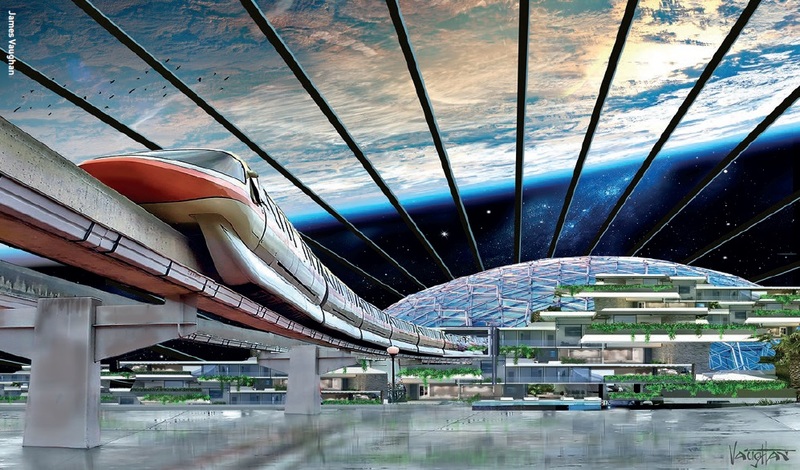 James Vaughan
James Vaughan
About the author
Ariadne Gallardo Figueroa, from Mérida, Mexico, is Chair of the Citizenship Committee in the Asgardia Parliament. One of her greatest interests is to foster a culture of change among the residents of Asgardia and to change the approach that has motivated humankind to be the worst enemies of ourselves. She is the author of the Bird Spell series of sci-fi novels, which she has dedicated to Asgardia, and hosts a YouTube channel titled ‘Asgardia - Flight Plan’ focused on preparations for the ambitious objective of humanity living in orbit and on other planets in the future.





